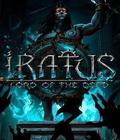Turn-based, roguelike RPGs still carry plenty of charm, especially when you find one that practically gives you no choice but to become a force for evil. That's Iratus: Lord of the Dead, which hits Steam Early Access later this month after being in development since 2016. We got a quick rundown of it during E3 2019, and what we saw looked like a Dungeon Keeper/Darkest Dungeon hybrid that's ready to absorb hours and hours of your life.
You assume the role of the titular character, Iratus, a necromancer so powerful and terrible that he was actually imprisoned for centuries by the forces of good. All was well until some miners accidentally cracked open the subterranean confines keeping the necromancer in check. Now he's on a mission to carve his own path of doom through the layers of the underworld and up to the surface, where he would naturally institute some reign of ultimate terror, as most dark-lord types are wont to do.
However, Iratus isn't one of those dark lords who handles his own business. He's more of a dark foreman or vile manager, dispatching troves of minions to carry out his demonic works. What makes these minions a special kind of weird is the fact you can build them from the body parts of slain human enemies. The defeated's remains are basically your resource pool: arms and legs, brains, the usual. You then find that you/Iratus is really good at building a diverse multitude of creatures with expansive catalogues of powers: banshees, succubi, vampires … even "brides." Each of the minions can also be boosted in power through the typical feeding of brains. Yes, brains.
The turn-based combat has a side-to-side, face-off viewpoint where you see the opposing sides literally stacked against each other. With the sheer number of minions and abilities they possess, a few sample battles showed me a taste of the myriad ways that skirmishes can shake out, but as anyone else who's gotten to check this game out have noticed, one of the more interesting damage-dealing combat aspects of the game is stress. It appears that some minions have the ability to mentally stress out enemies to the point of insanity, causing them to attack their friends.
Iratus: Lord of the Dead truly ends when Iratus completes his nefarious crusade or when he runs out of minions and resources to rebuild anyone. It sounds pretty simple, and the game — while layered with seemingly every RPG measurable imaginable — looked like it played simply, with a clean interface and relatively linear-seeming progression that's buttressed by punishing difficulty. When it hits Steam Early Access, we'll see how much help Iratus will get in his quest.
More articles about Iratus: Lord of the Dead











 Iratus: Lord of the Dead is an unorthodox, tactical dark fantasy roguelike that lets players revel in true evil as they plan for domination.
Iratus: Lord of the Dead is an unorthodox, tactical dark fantasy roguelike that lets players revel in true evil as they plan for domination.



















